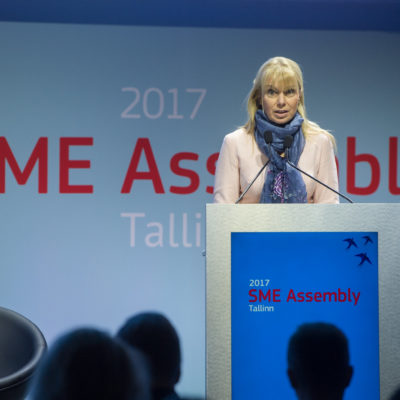Text by Triin Ilves
Photos by SME Assembly 2017
Techno-positive Natalia Hatalska notes that one possible for the future lets humans become the useless class. Orange Magazine found out more:
OM: In a nutshell, what are the five possible trajectories for the future that you have mapped down?
Natalia Hatalska: The first concept is “working forever” so we will be working until we are 90 or 95 years old and it’s connected with the concept of ageing society and people living longer in general.
The second one is that we will become the useless class, and it’s connected with the technological trends: automation, AI, robots. Essentially robots would take over our jobs.
The third one is connected with economic trend: digital economy or nomadism when we have more people working as freelancers, working flexible hours from different places and so on.
The fourth one is the most pessimistic one and it’s connected with the environmental trends, especially with climate change. In long term, if we don’t do anything then we won’’t have any jobs because we won’t have the planet. But down to earth and closer to today it affects our productivity so the internal operations of companies, they have to be more sustainable.
And the fifth scenario is connected to political transparency. We have to be transparent, open and all the information and what we do in companies will have to be available to the public.
See the summary of Living Buildings:
OM: Whereas it would be really easy to ask what will be the most possible outcome then I will ask: what would you like to see as a possible future scenario for us?
NH: Well as I said in the beginning of my presentation you can’t predict the future, you can only see the scenarios. These here are only five scenarios but, of course, we can make more of them. I don’t know, I like changes and I always treat changes as challenges.
OM: And you said earlier that you are quite the techno-optimistic?
NH: Yes. Of course, I, too, agree that technology creates a lot of problems and we have to overcome those problems but at the same time us as a humanity and how we lived 500 years ago and how we live now, you can see that we live much better today and this is because of the technology.
OM: You collect data from today to to make forecasts for the future. How predictable are the people today and how well can the data from today be used for these forecasts?
NH: We mainly base our data collection to qualitative methods. We use them as many as possible for one research or one project. If you use a lot of methods then the prediction is more precise. And we always look at the signals-based forecasting which means that we look at the presence for some signals that are already here and that can show us what could happen in the future. For example today we were talking about the autonomous cars how it will affect the moto industry. Of course, it will do so, but it will also affect insurance industry, for example we won’t have to insure our cars because they won’t make accidents anymore. It will affect hotel and motel industry because we don’t need hotels along the road because we don’t have to stop. It will affect our cities because we don’t have so many roads, so many parking areas and so on. Therefore we have to always look at the problem from different perspective and different industry view-points.
OM: Should we consider AI as our ally who we could work together in symbiosis or do we end up in the bleak outcome where technology overpowers humans?
NH: If we look at AI now, we can see that the best teams, especially at work, are made of human and AI. They are extremely efficient and they are much more efficient than AI or humans alone. We both have complementary skills so we, humans, are good at things that are creative, reasoning and so on and AI is better at data and analysing it, and also doing tasks that are repeated. So that’s why we are so good together. And I hope it will stay like this.





